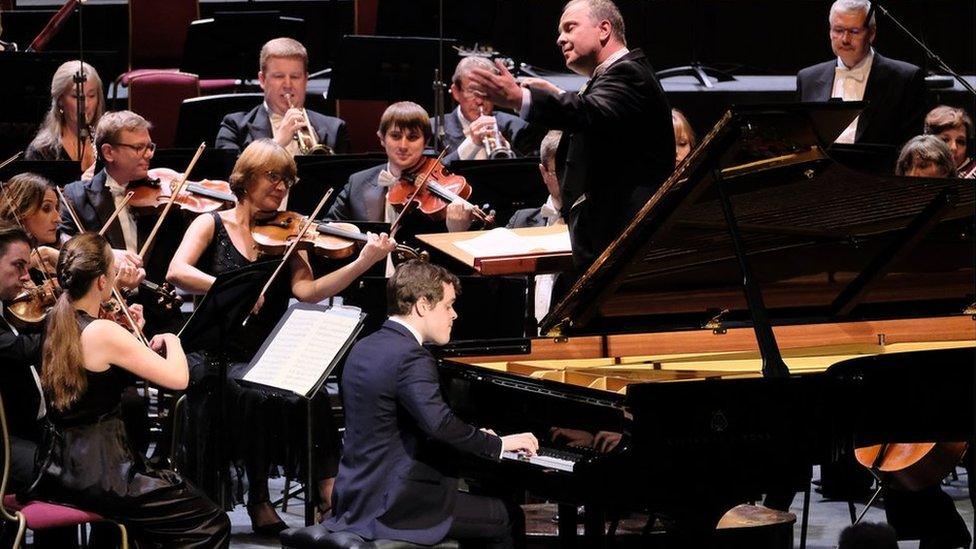Too hot to Handel: Classical music sales rise by 10%
- Published

Katherine Jenkins, Sheku-Kanneh Mason and Andrea Bocelli were among the year's biggest-sellers
Classical music was the fastest-growing genre in 2018, figures released by the recording industry show.
Buoyed by the likes of Andrea Bocelli, Katherine Jenkins and cellist Sheku Kanneh-Mason, sales and streams increased by 10.2% compared to 2017.
That compares favourably to the 5.7% rise in music consumption across all genres.
In fact, sales of classical CDs actually increased by 6.9% - bucking the downward trend in pop and rock.
Streams also showed significant growth in 2018, rising 42% year-on-year, compared to a 33% rise in the overall market.
Streaming now accounts for a quarter of classical consumption, lagging far behind the rest of the market, where the figure is 63.6%.
Music by the Italian pianist Ludovico Einaudi accounted for one in every 12 UK classical streams.
His tranquil and moving song Nuvole Biance, which featured in the 2010 film Insidious and TV drama This is England 86, has been streamed 137 million times on Spotify alone.
Allow YouTube content?
This article contains content provided by Google YouTube. We ask for your permission before anything is loaded, as they may be using cookies and other technologies. You may want to read Google’s cookie policy, external and privacy policy, external before accepting. To view this content choose ‘accept and continue’.
The BPI data also showed that seven of 2018's Top 30 best-selling classical albums were film soundtracks, with Howard Shore's Lord of the Rings and John Williams' Star Wars scores among among the most popular.
The overall best-seller was Andrea Bocelli's Si, which sold more than 200,000 copies - making it the first classical title to pass that threshold since 2012; and the first classical album to top the mainstream charts since James Horner's Titanic soundtrack in 1998.
"I would never have imagined achieving this, even in a country that welcomed me from the very beginning," said Bocelli. "Yet beyond the numbers and the charts, what really counts is the affection of an audience - the handshakes, the smiles, the applauses."
The figures were revealed over the weekend on BBC Radio 3's Music Matters.
"Classical obviously starts from a relatively small base," admitted BPI spokesman Gennaro Costaldo, "and if you go back five or six years, the [sales] figures would have been higher.
"But just compared to the last 12 months... there's a strong improvement and that gives us all encouragement."
Costaldo said classical was performing well on CD because "older listeners" and "passionate fans" appreciated the sleeve notes and additional resources that came with physical products; but that streaming was important for bringing in new audiences.
However, the uptake of classical music on the likes of Spotify and Apple Music has been frustrated by poor sorting and categorisation - making it almost impossible to navigate through multiple movements and recordings.
While efforts are being made to resolve those issues on mainstream platforms, classically-focused streaming services like Primephonic have sprung up, which allow searches by recording date, composer, artist, title, opus number and musical key.
The service also pays royalties per-second, rather than per-stream - resolving a long-held complaint about classical music, where individual tracks can last more than half-an-hour, yet attract the same royalty rate as a three-minute Rihanna song.
Castaldo said the growth in streaming was being driven by "a new generation of talent" including Sheku Kanneh-Mason, Alexis Ffrench and Jess Gillam.
Kanneh-Mason, who performed at the wedding of the Duke and Duchess of Sussex last year, had the biggest-selling classical debut of 2018, spending 14 weeks at number one on the classical charts.
"Sheku's probably the most important new artist to come along since the days of Pavarotti, in terms of really capturing the public imagination," said Costaldo.

Follow us on Facebook, external, on Twitter @BBCNewsEnts, external, or on Instagram at bbcnewsents, external. If you have a story suggestion email entertainment.news@bbc.co.uk, external.

- Published3 January 2019

- Published7 October 2018
